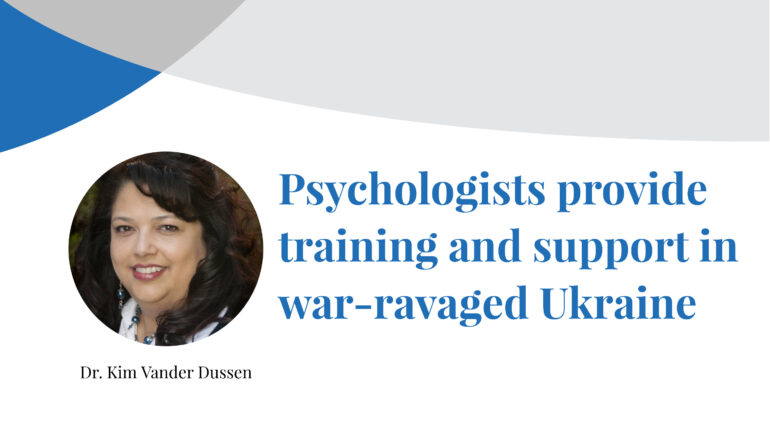The field of professional psychology in Ukraine is in its infancy. There is no licensing board, no training requirements, and no oversight. You need only a bachelor’s degree in psychology to practice.
After the annexation of the Crimea region, a group of counseling psychologists became involved in training clinicians in the country, in particular, to support the trauma of war and forced displacement. Dedicated to training Ukranian clinicians to serve children effectively, they developed the Play Therapy Training Institute within the University of Missouri. After the invasion of the rest of the country by Russia, they plunged into a more intensive crisis.
In the spring of 2022, Corie Schoeneberg, Ph.D., the Directory of the Play Therapy Training Institute, reached out to the play therapy community to provide additional war and crisis training assistance for the therapists she was working with. The circumstances for the clinicians working with children were dire. They needed help providing intervention in bomb shelters, with no supplies, no resources, and little to no privacy. The children were massively dysregulated by the bombing, food insecurity, and the death and destruction around them.
Naturally, the children and everyone caring for them were in an active terror state. These clinicians were also working with the soldiers and included those newly drafted into service. I provided a two-part training over the course of two weeks to clinicians working with these children. It was focused on play therapy interventions designed solely to help with regulation. The approach had to include providing interventions that were brief, required little to no supplies, and centered around co-regulation for the children.
One of the certifications I hold is in the Neurosequential Model of Therapeutics. It is a developmentally based, trauma-informed, evidenced-based clinical problem-solving tool that provides a conceptualization framework and assists with treatment planning for those impacted by trauma. With a heavy biological and neurological focus, it has provided critical language for helping others understand children. The play therapy interventions provided were connected to this framework.
The feedback from everyone involved was moving. Based on the success of these trainings, I was asked to provide a longer, five-month training series with the Neurosequential Network on some foundational principles of developmental trauma and its impact on functioning. With two other trainers, we completed a brief but critical overview of these principles and worked with these clinicians who went on to develop a plan for executing and planning intervention for Ukranian children in the schools and refugee centers. It was an extremely rewarding experience, providing care and training to the people who would be working for years with the Ukranian people.
I will close with a message I received from Dr. Shoeneberg, shared with her permission. It was a humbling and moving experience to have been a little bit of service.
“You did a wonderful job presenting for us tonight. Thank you so much! I also wanted to tell you a story that I thought would warm your heart. I was meeting with our lead Ukrainian faculty member last week and somehow your training from March came up. Our lead faculty, Katya, is a teaching and training machine, and I joke that she will have all of Ukraine trained before the end of this war. She is doing lots of training for Ukrainian military chaplains and for military mental health responders. She said that she met with a Ukrainian military guy who was very dysregulated and refused to do ‘any more of that stupid tapping,’ i.e., butterfly hug and GTEP-type stuff. So Katya did your “Bohemian Rhapsody” bi-lateral intervention, and he loved it! She said it was so amazing to see him regulate and warm up to the intervention so quickly, especially when he had been so resistant at first. She also said that she is using this story in all her trainings to the military mental health responders now and teaching them this intervention. She said that she thought you should know that this intervention is now being used on the frontlines of the war for Ukrainian soldiers. We don’t always get to hear good stories about what we put out into the world, so I wanted to be sure to tell you this one. Pretty amazing!”
Dr. Kim Vander Dussen is a Professor of Clinical Psychology at the Chicago School Anaheim|Campus. Dr. Vander Dussen is the Coordiator of the Child and Adolescent Concentration in the program. She is a former President of the California Branch of the Association for Play Therapy and is a Member of the Board of Directors for the Association for Play Therapy and has historically been heavily involved in the organization. Dr. Vander Dussen is a licensed psychologist and registered play therapist and supervisor. She has certificates in Play Therapy and Infant and Toddler Mental Health. She is certified in EMDR, the Neurosequetial Model of Therapeutics, and the Circle of Security Parenting. Dr. Vander Dussen also serves on the faculty of UCSD’s Play Therapy Certificate Program. She is in private practice and specializes in the treatment of childhood trauma, attachment, and children with developmental disabilities.

